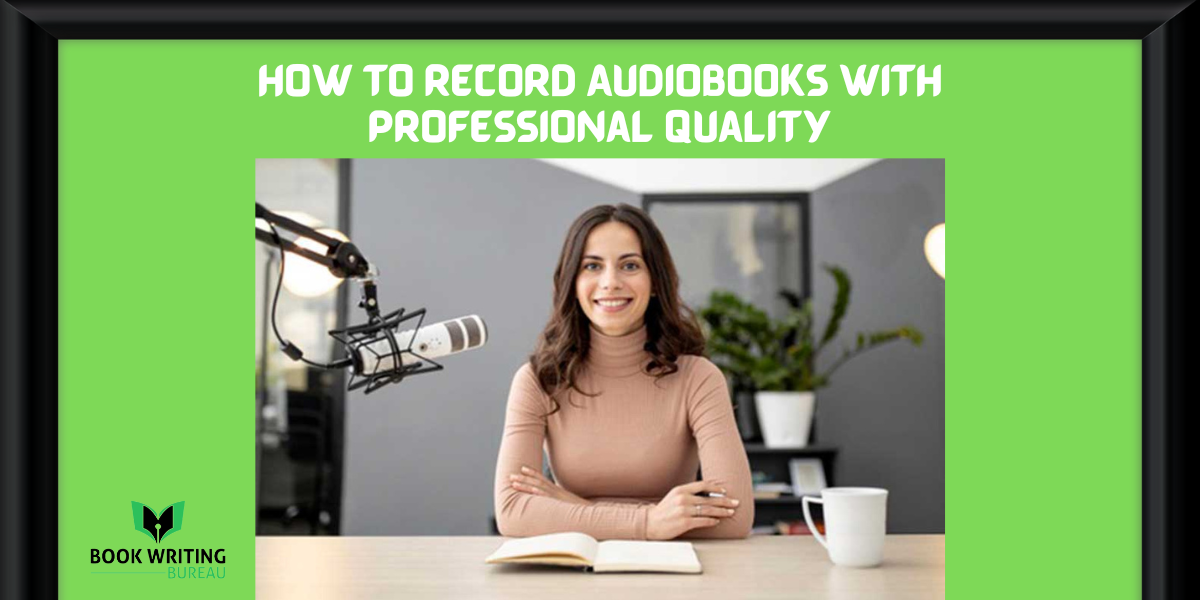
audiobook
Audiobooks are on the rise and are fast becoming a favorite for people who love to read but can’t always find the time to sit down with a book.
With the audiobook market growing exponentially, it’s no wonder that more authors and publishers are turning to audio recordings to reach their audience. But recording an audiobook is not just about reading aloud in front of a microphone. It takes careful planning, preparation, technique, and equipment to produce professional-quality audio.
In this blog post, our audiobook services expert will cover all the steps you need to know about how to record audiobooks like a pro. From setting up your recording studio to selecting the right equipment and techniques for clear narration, we’ve got you covered. So if you’re ready to take your audiobook recording skills to the next level and create an immersive listening experience for your audience, read on!
Understanding the Audiobook Market
Audiobooks are quickly gaining popularity in the modern era, thanks to their unparalleled convenience and accessibility. With the rise of digital platforms, distributing and consuming audiobooks has become easier than ever before. This allows readers to enjoy a unique listening experience while multitasking. It’s worth noting that the audiobook market is rapidly expanding, with an increasing number of titles being released each year.
The Rise of Audiobooks
The popularity of audiobooks has skyrocketed in recent years, and it’s easy to see why. The convenience of being able to listen to books while on the go has made them a hit among busy individuals. With advances in technology, producing and distributing the best audiobooks has become easier than ever. Streaming services and smartphones have played a significant role in making audiobooks more accessible to a wider audience. Whether you’re a fan of fiction or nonfiction, audiobooks offer a great way to immerse yourself in a story or learn something new. If you’re considering creating your own audiobook, it’s essential to invest in the right recording equipment and find your own audiobook narrator. With the right tools and a good idea, you can bring your story to life and reach a whole new audience. So why not take the first step and explore the world of audiobook narration? The rise of audiobooks is here to stay, and it’s time to jump on board.
Why Choose Audiobook Recording?
Audiobook recording offers authors a chance to expand their readership and generate additional revenue. It enhances the storytelling experience for readers, bringing characters and stories to life in a unique way. Discover the benefits of audiobook recording and the impact it can have on your audience.
Preparing to Record Audiobooks
Selecting the perfect story for your audiobook is paramount to its success. Authors face the choice of either self-recording or hiring professional audiobook narrators. Planning and preparation play a pivotal role in ensuring a seamless recording process. As you embark on this audio adventure, equip yourself with the right tools. A good quality mic is essential for capturing clear and crisp narration. Also, make sure that you have a mic test to fix any issues that may arise before recording.
Additionally, familiarize yourself with editing software like Pro Tools to enhance the final product. Creating your own audiobook can be a rewarding and exciting experience, but remember that it requires hard work and dedication. Consider seeking guidance from YouTube videos or working with a voice actor through platforms like Upwork. The first step to a successful audiobook recording begins with careful planning and professional-grade recording equipment.
Choosing the Right Story
Choosing the right story for your audiobook is a crucial step in creating a captivating listening experience. To ensure professional quality, look for stories that lend themselves well to the audio format, with engaging dialogue and descriptive language that will come to life when narrated. Consider your target audience and their preferences when selecting a story, as it plays a vital role in the success of your audiobook. Additionally, take into account the length of the story, as longer books may require more recording time. Remember, as an audiobook narrator, your goal is to immerse listeners in the story and keep them engaged throughout. By choosing the right story, you set the foundation for a remarkable audiobook experience.
Deciding on Self-Recording vs Hiring Professionals
When it comes to recording your audiobook, you have an important decision to make: should you self-record or hire professionals? Both options have their advantages. Self-recording gives you full creative control over your audiobook, allowing you to bring your vision to life. On the other hand, hiring professionals ensures high-quality audio and a polished finished product. When making this decision, consider factors such as your budget, time constraints, and technical expertise. If you have the necessary recording equipment and editing skills, self-recording might be the best way for you to create your own audiobook. However, if you prefer to leave the recording process to the experts, hiring a professional narrator can be a great way to ensure top-notch quality. Ultimately, the choice is yours. Whether you decide to take on the role of the narrator yourself or entrust it to a professional, the most important thing is to create an audiobook that captivates your audience and brings your story to life.
How to Set Up Your Audiobook Recording Studio
Setting up your audiobook recording studio is an exciting and crucial step toward creating professional-quality audio content. To ensure optimal results, you’ll need the right equipment and a quiet recording environment. Whether you choose to set up a home studio or opt for a professional recording studio, each option has its pros and cons. A home studio offers convenience and flexibility, allowing you to record in the comfort of your own space. On the other hand, a professional book video and audio production studio provide access to high-end equipment and experienced engineers who can help you achieve top-notch audio quality.
When setting up your home studio, invest in a good microphone and consider using professional editing software like Pro Tools to enhance the sound. Creating a quiet recording environment is crucial, as background noise can be detrimental to the overall quality of your audiobook. If you decide to go the professional studio route, do thorough research to find a reputable one with a track record of success in audiobook production. Ultimately, the choice between a home studio and a professional studio depends on your budget, level of expertise, and specific needs.
Home Studio Setup Guide
Creating a professional-quality audiobook requires careful attention to your home studio setup. First, select a suitable location that is free from external noise and distractions. This will ensure optimal recording conditions and minimize interruptions. Invest in high-quality equipment such as a microphone, headphones, and recording software to achieve professional results. The right microphone will capture your voice with clarity and richness, while quality headphones will allow you to monitor the audio accurately. Additionally, consider using soundproofing materials or a recording booth to further improve sound quality and minimize background noise. By following these recommendations, you can create a conducive environment for recording your audiobook and producing a top-notch final product.
Benefits of a Professional Recording Studio
When it comes to recording audiobooks, there are numerous benefits to working in a professional recording studio. One of the key advantages is having access to state-of-the-art equipment and experienced sound engineers who can help you achieve the best possible audio quality. In a controlled studio environment, you can ensure optimal sound quality by eliminating background noise and other distractions. Another advantage of working with professionals is that it saves you time and effort. Instead of focusing on the technical aspects of recording, you can concentrate on other important aspects of your work, such as writing or marketing your audiobook. By collaborating with a professional recording studio, you can enhance the overall quality of your audiobook production.
Essential Equipment for Audiobook Recording
To record audiobooks with professional quality, you need to have the essential equipment. First and foremost, a high-quality microphone is essential for capturing clear and professional audio. It ensures that your narration comes through with clarity and richness, creating an engaging listening experience. Additionally, using a pop filter can help reduce plosive sounds during recording, resulting in a smoother and more polished audio output.
Investing in a good pair of headphones is also crucial for monitoring audio quality.
They allow you to hear every detail of your recording, ensuring that it meets the highest standards. To edit and refine your recordings, you’ll need recording software like Adobe Audition or Audacity. These tools provide the necessary features for editing, mixing, and post-production, giving you full control over your audiobook’s final sound.
By having the right equipment – a high-quality microphone, a pop filter, good headphones, and recording software – you’ll be well-equipped to create professional-grade audiobooks that captivate listeners and bring your story to life. So, ensure you have these essentials in place before diving into the recording process.
Selecting the Right Microphone
When it comes to recording your own audiobook, selecting the right microphone is crucial for capturing professional-quality audio. Your voice and recording space plays a significant role in determining the microphone that suits your needs.
Consider factors such as sensitivity, frequency response, and polar pattern when choosing a microphone. You can find lots of microphone review websites online. The one we can recommend is micgurus.
It is important to find a microphone that minimizes background noise, allowing for a clean recording. Look for a microphone with a good signal-to-noise ratio to ensure optimal audio quality. Dynamic microphones are known for their durability and ability to handle high sound pressure levels, making them a popular choice for audiobook narration.
Importance of Quality Headphones
Investing in high-quality headphones is crucial for accurately monitoring your audio recordings. When it comes to recording audiobooks, having headphones with a flat frequency response is essential. This ensures that the sound reproduction is accurate and faithful to the original recording. Additionally, closed-back headphones help isolate external noise, allowing you to focus on your narration without distractions.
Comfort is also important, especially during long recording sessions, so consider opting for over-ear headphones. Furthermore, choosing headphones with a wide frequency range enables you to capture the subtle nuances in your audio, creating a more immersive listening experience for your audience.
Navigating Audio Recording Software
When it comes to recording your own audiobook, navigating audio recording software is a crucial step. Familiarize yourself with popular recording software like Audacity or Adobe Audition for a seamless recording experience. Take the time to learn how to set up your recording preferences and adjust input levels to ensure optimal sound quality. Understanding basic editing functions such as cutting, pasting, and fading audio clips will help you polish your recordings.
Don’t be afraid to explore advanced features like noise reduction and equalization to enhance the overall audio quality of your audiobook. Additionally, taking advantage of keyboard shortcuts can greatly streamline your recording workflow, saving you time and effort. With the right software knowledge and skills, you can create professional-quality audiobooks that captivate your audience.
Techniques for High-Quality Audiobook Recording
To achieve professional-grade audiobook recordings, it’s crucial to employ certain techniques. Start by creating a quiet recording environment through soundproofing your space, ensuring that external noises don’t interfere with the narration. Position yourself close to the mic for consistent and clear audio delivery, capturing every nuance of your voice. Use a pop filter to reduce plosive sounds and enhance clarity. Experiment with microphone placement to find the ideal distance that complements your voice. Lastly, practice proper breath control to prevent unwanted noise during narration.
Tips for Clear Narration
To ensure that your audiobook is of professional quality, there are some essential tips for clear narration that you should keep in mind. First and foremost, it’s crucial to speak clearly and enunciate words to ensure clarity in your narration. This will help your listeners understand every word and follow along easily. Additionally, using appropriate pacing throughout the audiobook will maintain listener engagement and prevent them from getting bored or losing interest.
When narrating an audiobook, it’s important to emphasize important words and phrases to convey meaning effectively. This will help bring the story to life and make it more engaging for your audience. Practice modulating your voice to add depth and character to different characters or sections of the book. This can make the listening experience more immersive and enjoyable for your audience.
Lastly, taking breaks when needed is essential to maintain vocal stamina and prevent vocal fatigue. Narrating an entire audiobook can be a lot of work, so it’s important to give yourself time to rest and recharge.
How to Manage Recording Sessions Effectively
To ensure that your audiobook recordings are of professional quality, it is essential to manage your recording sessions effectively. One way to do this is by setting aside dedicated time for your sessions. By maintaining consistency in your recording schedule, you can stay focused and make progress on your audiobook project.
Before each session, it’s important to warm up your voice. Just like any other muscle, your vocal cords need some exercise to perform optimally. You can do this by doing vocal exercises or even humming a few scales. This will help reduce the risk of strain and ensure smooth narration throughout your recording sessions.
Another helpful tip is to plan your recording sessions in advance. By creating a schedule and sticking to it, you can stay organized and avoid wasting time deciding what to record next. It’s also a good idea to break down longer chapters or sections into more manageable sessions. This way, you can maintain focus and quality throughout the recording process.
Remember to take short breaks during your recording sessions. This will give your voice some rest and help you maintain its clarity and freshness. Use this time to stretch, hydrate, or even do some vocal relaxation exercises.
Post-Recording Process
Now that you’ve completed the recording of your audiobook, it’s time to move on to the post-recording process. This is where you’ll polish your recordings to ensure a professional and high-quality final product. Start by editing your audiobook recordings using audio editing software. This will allow you to remove any mistakes or imperfections and enhance the overall quality.
Apply noise reduction techniques to minimize background noise and improve clarity. Another important step is to ensure consistent audio levels throughout the audiobook by adjusting volume levels. This will help maintain a smooth listening experience for your audience.
If you want to take it a step further, consider hiring a professional audio editor for a polished final product. They can bring their expertise and experience to make your audiobook shine. With these post-recording processes, you’ll be well on your way to creating a professional-quality audiobook that captivates your listeners.
Editing Your Audiobook
Editing your audiobook is a crucial step in ensuring a professional-quality end product. During the editing process, you will remove any unwanted breathing sounds, mouth clicks, or other noises that may distract your listeners.
Smooth transitions between audio clips will create a seamless listening experience, keeping your audience engaged from start to finish. It’s important to make necessary edits or adjustments to correct any mistakes or inconsistencies that may have occurred during the recording process.
Take the time to listen to your audiobook multiple times during editing for quality assurance and to ensure that it meets your desired standards. Finally, export your edited audiobook as a high-quality audio file ready for distribution to platforms such as ACX, YouTube, or Google Play.
Checking and Balancing Audio Levels
Checking and balancing audio levels is a crucial step in producing a professional-quality audiobook. One of the key aspects to focus on is normalizing the audio levels, which ensures consistent volume throughout the audiobook. This means that listeners won’t have to constantly adjust the volume while listening.
Another important technique is the use of compression to control the dynamic range of the audio. By balancing the loud and soft sections, compression maintains a more even and enjoyable listening experience. Additionally, adjusting the equalization can enhance the tonal balance of your recordings, making them sound more polished and professional.
Monitoring peak levels is also essential to prevent distortion and clipping in your audio. By keeping an eye on the highest points of your recordings, you can ensure that they stay within acceptable limits. Finally, testing your audiobook on different playback devices is necessary to guarantee optimal sound quality across various platforms.
Distributing Your Audiobook
Once you have finished recording your audiobook with professional quality, the next step is to distribute it to reach your target audience. Research and choose a suitable audiobook distribution platform that aligns with your goals and preferences. Platforms like ACX or Audible offer a wide reach and easy interface for uploading and formatting your files. However, don’t limit yourself to just one platform – consider self-publishing your audiobook to have complete control over distribution rights.
In addition to digital platforms, explore other distribution options such as partnering with self-publishing companies or libraries to expand your reach even further. Promotion is key to getting your audiobook noticed, so leverage social media, email marketing, and other promotional channels to create buzz around your work.
Platforms for Publishing Your Audiobook
When it comes to publishing your audiobook, there are several platforms available that can help you reach a wide audience. One popular option is ACX, which is Amazon’s audiobook creation exchange. This platform not only allows you to record your audiobook but also provides the opportunity to self-publish it.
Another platform to consider is Findaway Voices, which offers a user-friendly interface and a variety of distribution options. Audible, a well-known platform for audiobook listeners, also offers options for authors to self-publish their audiobooks.
Author’s Republic is another platform worth considering as it offers distribution to various audiobook retailers, including Audible and Apple. Lastly, Podium Audio is a newer platform that offers competitive royalty rates and a streamlined process for audiobook production and publishing. With these platforms, you have the opportunity to share your own audiobook with the world and connect with a vast audience.
Can Anyone Record a Professional Quality Audiobook?
Achieving professional quality in audiobook recording is possible for anyone. It requires the right equipment, techniques, and a focus on good sound quality. Practice and preparation are key to producing a polished final product. Consider hiring a professional editor to ensure top-notch quality.
Conclusion
In conclusion, recording audiobooks with professional quality is an attainable goal for anyone passionate about storytelling. With the rise of audiobooks and the increasing demand for high-quality narration, it is essential to understand the audiobook market and why it is worth investing your time and effort into recording one. Whether you choose to self-record or hire professionals, preparing and setting up your recording studio with the right equipment is crucial for achieving the desired sound.
Additionally, mastering techniques for clear narration and effectively managing recording sessions will contribute to a professional end result. Finally, the post-recording process and distribution of your audiobook are important steps in reaching your audience.
Remember, with dedication, practice, and the right resources, anyone can professionally record audiobooks that captivate listeners. Happy recording!



